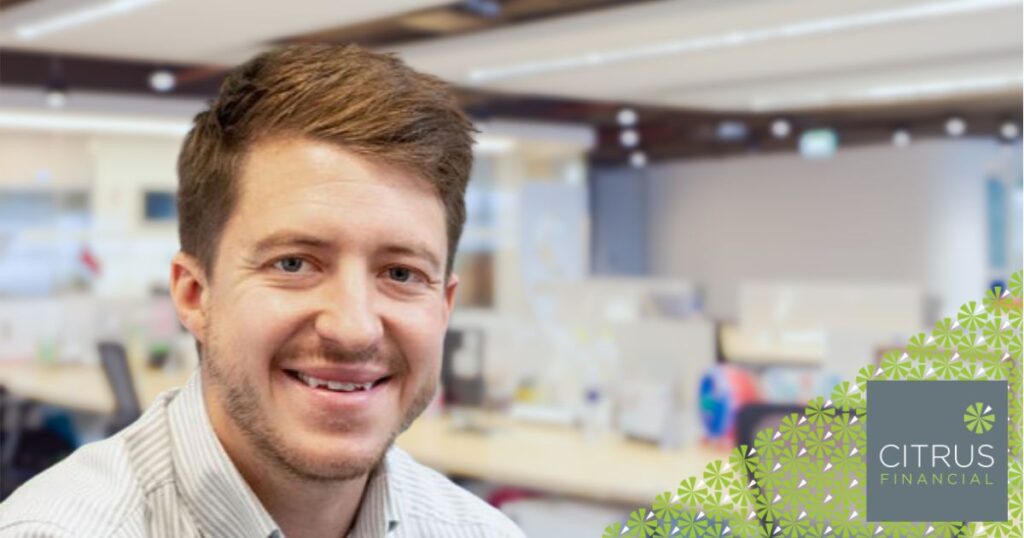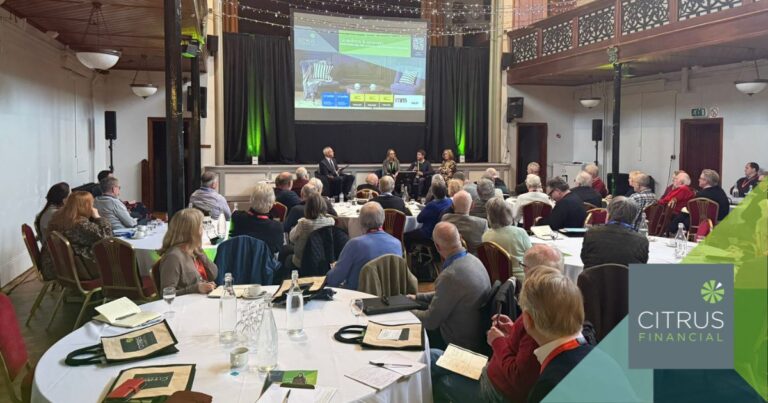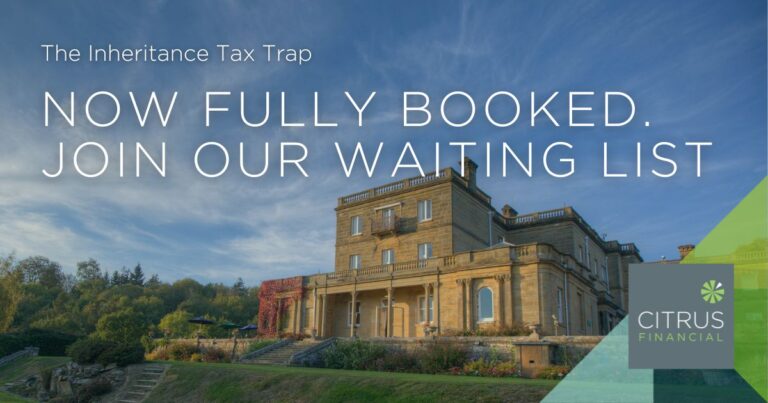Calm, insightful and highly respected, Craig Brady is a key part of the Citrus Financial team. With a first-class Economics degree, a sharp analytical mind and a natural ability to explain complex ideas clearly, Craig has built a reputation for being both technically excellent and genuinely approachable. He joined Citrus as a paraplanner in 2016 and became an adviser in 2018.
We caught up with Craig to talk about his journey into financial advice, why clients should never wait to get help, and what might surprise you about life outside the office.
How did you become interested in financial advice?
I’ve always wanted to work with numbers, and my first real interest was in the stock market, even before I was old enough to study economics at school. I thought I’d become a stockbroker, so I studied Economics at university. But I graduated in 2009… right in the middle of the global financial crisis.
I applied for hundreds of banking jobs and didn’t even get one interview. So, I joined a pensions firm in Kent, which was my first real exposure to financial services. Later, I moved to London to work for a private bank. That’s when I started seeing what financial advisers did, and I knew that’s what I wanted to do. As soon as the penny dropped, I began working towards my qualifications.
what really matters is listening, understanding people, and building trust.
You joined Citrus as a paraplanner back in 2016 — what do you remember about those early days?
I had my adviser qualifications but no experience working directly with clients. So, I joined as a paraplanner supporting David Braithwaite and David Parker, which gave me a really strong grounding. Most of my experience at that point was around pensions, so I needed to build up my knowledge of investments and protection too.
What motivated you to take the next step and become an adviser?
That was always the plan. I wanted to start sitting in on meetings to build confidence and learn from experience. Working with both Davids was really helpful, they had different styles, so I learned a lot from both of them. You can know the process inside out, but nothing prepares you for sitting in front of clients on your own. It’s a very personal job.
You don’t have to be wealthy, the value often comes from making smarter decisions with what you already have.
You’ve got a first-class degree in Economics, does that change how you advise clients?
Yes and no. It gives me useful background on how economies and markets work, but I’ve realised the job is much more about relationships than I expected. Yes, we deal with things like pensions and investing more tax efficiently, but what really matters is listening, understanding people, and building trust.
What do you enjoy most about your role at Citrus?
The level of trust you build with clients. People tell you everything, their goals, their worries, their health issues, their dreams. It’s incredibly personal, and you feel the weight of those expectations. If someone tells you they want to retire at 60 and you’re helping them build towards that, you get emotionally invested. The technical side – like choosing suitable investments or making sure someone is using the tax allowances available to them – is the easy bit. The human side is where the job really matters.
What’s one piece of advice you find yourself giving again and again?
Start sooner. So many clients come to us in their mid-50s and say, “I wish I’d done this 10 years ago.” Life gets in the way, kids, mortgages, day-to-day priorities, and future planning goes on the back burner. But even small steps taken earlier can make a huge difference.
... people who benefit most from advice are often the ones who least expect it.
Are there any common regrets you hear from clients?
The biggest one is not getting advice earlier. People don’t pay attention to things like their pension funds. They just sit in the default option and forget about it. Or they think they don’t have “enough” to justify speaking to an adviser.
Even small changes, like increasing pension contributions by 1–2% a year, or using the available tax reliefs more effectively, can make a huge difference over time. But most people are too busy to think about it. Ideally, that’s where we come in. You don’t have to be wealthy, the value often comes from making smarter decisions with what you already have.
What makes Citrus Financial different from other firms?
Even though we’re growing, we still know every client. We do everything in-house, and it still feels like a family. Our clients are part of that family. I still remember names from when I was a paraplanner. That personal connection is something you often lose in bigger firms.
How have you seen client attitudes to money change recently?
There’s definitely more focus now on making the most of available tax allowances, especially among younger clients. People are thinking more about where their income goes, how they use their ISAs or pensions, and how to be as efficient as possible.
I’m also seeing more people come to us after receiving an inheritance. Property values in the South East mean even a modest inheritance can lead to quite a large amount of money that people want help managing.
What would you say to someone who’s never worked with a financial adviser?
Don’t wait until it feels urgent, even a 10-minute chat can make sure you’re not missing out on anything important. Whether it’s choosing the right pension fund, making use of tax-free allowances, or making sure your savings are working as hard as they can, a little advice can go a long way.
And again, you don’t have to be wealthy. People are often self-deprecating and assume they aren’t “the right type” of client, but the people who benefit most from advice are often the ones who least expect it.
What do you enjoy doing when you’re not working?
I’ve got a young family, so they keep me busy! I’m a big Manchester United fan and try to get to games when I can. I made it to seven last season and have plans for more this year (subject to approval from my wife!). I’d also like to get my son along to more local games at Maidstone United.
Any personal goals or ambitions?
Travel. I never had the travel bug when I was younger, but now I’d love to see more of the world, ideally combining it with sport. Watching cricket or the Lions in Cape Town would be amazing.
If you weren’t a financial adviser, what would you be doing?
Something in sport. Ideally combining my love of football with my interest in statistics. Premier League clubs use so much data now to track performance, scouting, and injuries. I’d love to be involved in that kind of analysis.
What might clients be surprised to learn about you?
Most know I’m into sport, but probably not that I have a real love of history. It was actually my favourite subject at school before I chose Economics. I enjoy historical documentaries and would love to tie that interest into travel when the kids are older. I also speak a decent amount of Spanish, I’m a bit rusty now, but I’ve started teaching the kids!
Quickfire Round
Tea or coffee?
Two cups of coffee first thing, then tea for the rest of the day
Beach holiday or countryside break?
Beach
Early bird or night owl?
Early bird — thanks to the kids!
Favourite footballer?
Eric Cantona (sorry David Beckham)
What are you watching?
The Traitors, Race Across The World, and Fool Me Once — all brilliant
You can meet more members of the team here.
The value of pensions and investments can fall as well as rise. You may get back less than you invested.
Tax planning is not regulated by the Financial Conduct Authority.
Approver Quilter Financial Services Limited & Quilter Mortgage Planning Limited. 22/07/2025




